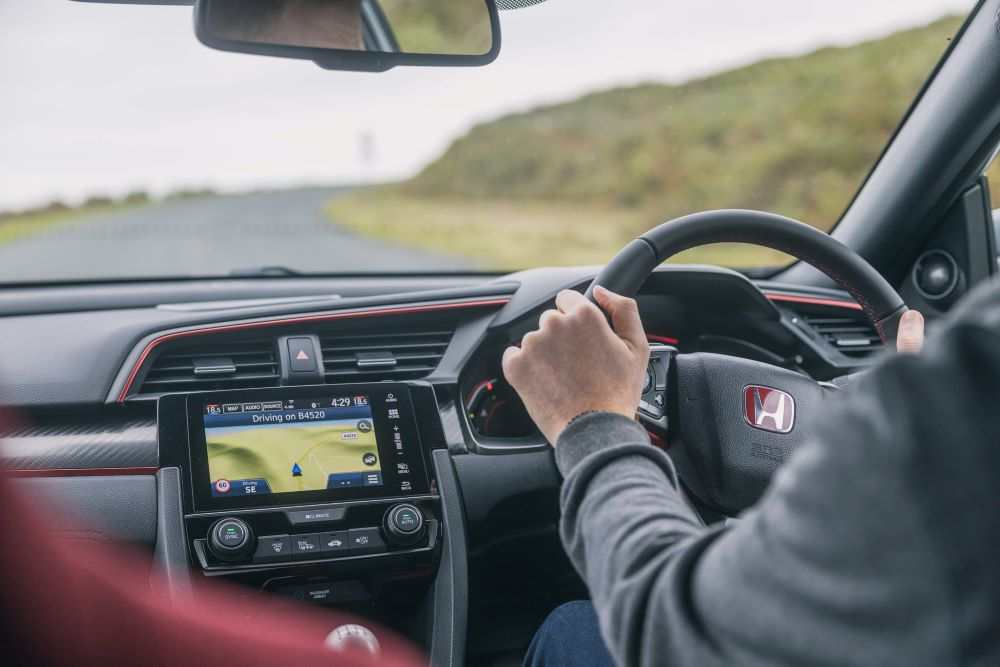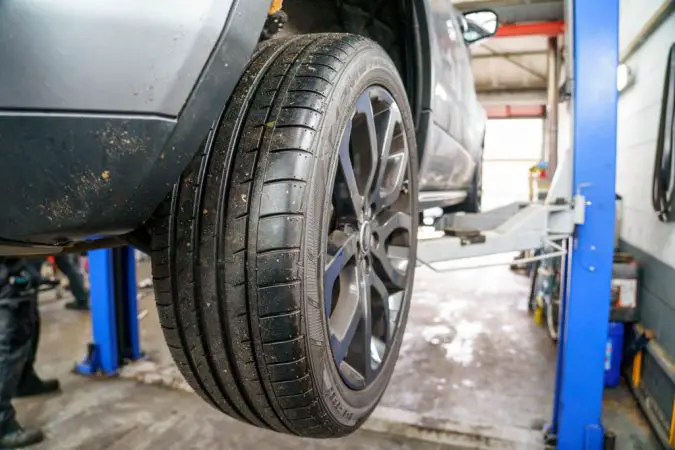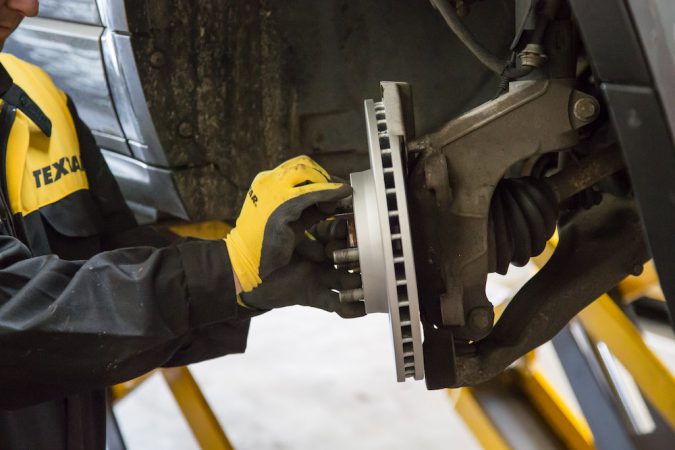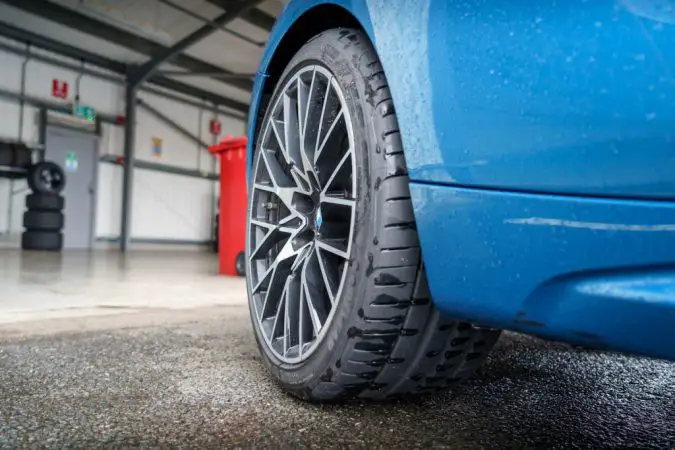Are you experiencing some weird noises when you are turning? This can be really annoying since a grinding noise when turning can ruin your day. That’s why you need to learn more about what could cause these noises and how to tackle them quickly and effectively before any more damage is done to your vehicle.
- Why Do You Hear A Grinding Noise?
- Common Reasons Why It Happens
- Other Possibilities & Causes
- Cost To Fix & Repair This Issue
- Wheel Alignment
- Final Conclusion
If you delay the repairs, they can cost you a lot more money than you have previously anticipated. Why I’m saying this is because they are going to affect your vehicle’s handling and performance and possibly damage other components that are around them or components that are affected by this situation. Since all components need to work perfectly smoothly if you want to have a properly running car.
Not to mention that it is quite dangerous to drive like this with grinding noises. Because who knows what could be the problem. It could be some suspension component that is crucial in maintaining your stability and performance on the road. If the component fails completely all of a sudden, you might be left stranded or possibly driven into a dangerous situation. That’s why when you notice a grinding noise when turning you have to react quickly. That’s why we are going to help you out.
In this article, we are going to cover everything you need to know when it comes to grinding noise. We will learn the basics and then we will move on to understanding the reasons behind the problem of grinding noise when turning. Then we will see the possible solutions and the costs. So, let’s dive into it.
Grinding Noise While Driving
The grinding noise when turning is audible information that you receive whose goal is to inform you that there is something wrong with your vehicle and this problem needs checking as soon as possible.
It is a good idea to locate the point from where this sound is coming to better understand this problem and quickly solve it before it gets even worse.
That’s why you need to learn how to troubleshoot and learn how to locate the place from where this grinding sound is coming from.
When you locate the place from where the sound is coming then you can move on to diagnosing the issue. Let’s say that the sound comes from one of the front wheels which is one of the most obvious places where the sound comes if it’s a grinding noise.
Then you need to move on and see the condition of the components if they are damaged and also look for replacement parts. We are going to discuss the reasons in the following chapters to dissect the problem and help you solve it quickly and effectively.
Just to let you know first, that when you are experiencing suspension problems like this. It means that there are issues with the suspension components. It is risky to continue driving like this and you should do everything under your power to get this problem fixed.
I’m saying this because it is not very safe to drive like this and also your alignment could be poor. This driving with bad alignment could eat up your tires and cause your tires to wear off prematurely and you end up paying thousands of dollars for repairs. Now let’s see the possible reasons.
Grinding Noise When Turning
We have covered the basics when it comes to this problem and we explained how to read this audible information. So, if you notice a grinding noise when turning, you need to focus more on the suspension components and see which of them is going bad.
But which of the suspension components that are affected can make that grinding noise when turning and how to quickly find the real culprit? Let’s elaborate.
Grinding Noise When Turning, Causes #1: Bad Wheel Bearings
The wheel bearings as their name implies are bearings that are located in the front wheel hub assembly. This bearing has the role of giving the ability of the vehicle to roll without any friction between the components.
These bearings that are installed in the wheel hub assembly are the key to making this action possible. Without the bearings, the components would friction and will wear down prematurely.
That’s why the wheel bearings are key in making all this magic possible. They are basically steel balls that are installed in a housing. In the housing, there is the grease which reduces the friction to a minimum and allows the bearings to survive even hundreds of thousands of miles.
But sometimes, the bearings tend to fail and develop some issues. They will start developing some grinding noise when turning or whining noise at high speeds.
They can also make your front end extremely unstable if they are not running properly. That’s why they are one of the primary suspects when it comes to the problem of grinding noise when turning.
When this problem happens, there is no material or grease left inside of these bearings and this makes the bearings friction and noises are starting to hear.
It’s up to you to diagnose the bearing and replace it before things get worse and the problem affects other components in your suspension.
To diagnose a bad wheel bearing. Jack up the car in the air. Give the tire a wiggle on the left and right. If there is a big amount of play it means that the bearing is shot and has to be replaced.
Grinding Noise When Turning, Causes #2: Bad CV Joint
The CV joint is the second probable cause for the grinding noise when turning. But what is a CV axle? A CV axle is something similar to an axle at an angle.
The CV axle is an ingenious design that made cars a lot more stable and drivable. But why? The CV axle, unlike a regular solid axle, works with bearings. This means that the CV axle can go up and down at any angle that the vehicle needs to deliver proper wheel spin. And all this work is made possible by the CV joints.
This makes the CV axle very versatile and almost every front-wheel drive or rear-wheel drive car now is using CV joints instead of the old solid axles that do not offer a lot of versatility.
Cars with CV axles drive better and handle better at the same time. This unfortunately doesn’t mean that they do not break.
If you drive your car over a big nasty pothole, you could break your CV axle. Also, if the axle is pretty old. The bearings that are on the inside will start to lose the grease and this will result in grinding noise when turning. The grinding noise is highly likely caused by the bearings that rub against the metal inside of the housing.
In this case, you know that your CV axle is shot and needs replacing. But it is quite useful to learn how to check if your CV joint is bad. To do this, you will have to remove the rubber booth that is hiding the joint. If the rubber booth has leaks and the inside looks pretty worn out. Then you will highly likely need a new CV axle.
Grinding Noise When Turning, Causes #3: Bad Brake Pads And Rotors
Damaged brakes can also cause your car to make a grinding noise when turning or braking. So, why is this the case? Brake pads and rotors wear down.
If you are running your worn brake pads like this, will start to eat down the rotor. This means that metal with metal contact will be present and your rotors are going to fail as well.
This grinding noise can cause sparks to develop and other dangerous problems. That’s why if your brake rotors are worn off. It’s high time to replace them with new OEM parts if you want to avoid any future issues with your braking system and also not end up in an accident.
The braking system is key in making your car stop and without it, you will probably be left praying that everything is going to be ok. And you don’t want that.
Check the rotors and their condition, and see how much meat is on the brake pads. If they are worn down completely. It means that this sound is very probably caused by them and you need to replace them with new components.
Find the best rotors and pads for your budget and replace the old components. Any pads and rotors will do the trick and you will no longer hear that grinding noise when turning. Also, you will be a lot safer in your car, and this will guarantee the drivability of your vehicle.
Grinding Noise When Turning, Causes #4: Damaged Control Arm Bushings
Another component that can cause grinding noise when turning is the damaged control arm bushing. But why is this the case?
Bushings are rubber components. These rubber components over time become hard and start to develop cracks. When the bushing starts to crack, you will notice how the driving experience is not that good anymore and your stability on the road is not the same.
The car could pull on one side and cause several problems when driving. That’s why replacing these bushings is a smart idea.
These bushings do not always grind. But if they are never replaced and the car has more than 150,000 miles. Maybe there are no bushings left on the control arm. So, the control arm could grind against the chassis and this grinding could be most noticeable when turning the wheel on a corner.
This is the case because when the wheel turns, the whole front end will start to turn as well if there are no bushings. Since the control arm will be free and there will be a lot of play.
That’s why replacing these components on time is key if you want to avoid some major problems like these to happen. If you can’t replace the bushings on your own. You can go to a mechanic that has the tooling needed for the bushings to be removed.
Or in some cases, it is even better to replace the whole control arm with a new OEM component and you will have no issues in the near future when it comes to these bushings and the grinding noise when turning.
Other Possible Reasons
There are also other problems that could cause grinding noises to appear. That’s why it is key to locate the noise and pinpoint your problem. In the following chapters, we are going to list some of the components that fail and develop grinding noises as well. This will be of great help not to misdiagnose the problem and fix something that is properly working.
Grinding Noise When Turning, Causes #5: Damaged Water Pump
A damaged water pump can also produce a grinding noise when turning. But why is this the case? The water pump is in charge of spinning the coolant in the cooling system.
When the water pump gets damaged. The water pump will produce noises that will be hard to get away from.
These sounds will very likely resemble metal grinding and you could easily confuse this grinding with the grinding on when some suspension components get damaged. That’s why you need to listen well and see if the sound comes from the water pump. If the sound comes from the water pump, then you know your culprit.
Grinding Noise When Turning, Causes #6: Bad Alternator
Alternators can also go bad and cause grinding noises. These grinding noises will be most pronounced when you step on the gas pedal and the belt starts spinning faster. Similarly with the water pump.
The problem with the alternator is that the bearings on the shaft are done. This affects the geometry in the shaft and the shaft loses its balance and the brushes of the alternator start rubbing against the wall.
The result of this will be a grinding sound. But similarly with the water pump. When these components have gone bad. Grinding sounds are heard all of the time and you cannot escape from them.
That’s why when you hear a grinding sound coming from the engine bay. Open up the hood and inspect the alternator. If some sounds are coming from the alternator, it means that the alternator is broken and needs replacing.
Grinding Noise When Turning, Causes #7: AC Compressor Failure
The AC compressor can also fail and develop grinding noise when turning. This is the case because the compressor is a complex component that has internal shafts and other bits and pieces that when start to fail are causing grinding noises to develop.
These noises will be pronounced when you turn the AC on and the compressor starts spinning. These noises can be very disturbing and really annoy you. But it’s not that difficult to locate the place where the sound is coming from. The only solution would be to replace the AC compressor with a new one. This can be rather expensive because compressors are pretty pricey.
Grinding Noise When Turning, Causes #8: Broken Transmission
A broken transmission can also make grinding noises when shifting. But why is this the case? This is the case because transmissions can develop issues if they are not maintained properly or if they have a lot of miles on them.
When you have a grinding noise coming from the transmission. You know that something is going down soon. The transmission will fail completely sooner or later because there is metal rubbing with metal and the transmission has a problem shifting.
The only solution for this problem would be replacing the transmission with a new one or doing a proper rebuild. This will be rather expensive but, there is no way around it.
So, if the grinding noise comes from the center of the vehicle right next to the driver seat. You know that it’s a transmission-related problem.
Grinding Noise When Turning, Causes #9: Broken Radiator Fan
Radiator fans can also break and develop a grinding noise when turning. Similarly, to other components that spin, like the AC compressor, alternator, and CV axles, they also have bearings inside them.
These bearings after many long years of use can start to develop some issues and fail. When the bearing fails, the fan will lose its balance and will start to grind on the housing or on the radiator.
If you notice that when the fan kicks in to cool down the car if it grinds it’s 100% the fan’s fault. The only way around this would be to replace the fan with a new one and you will be good to go.
Grinding Noise When Turning, Causes #10: Power Steering Pump Issues
The power steering pump assists in making steering your vehicle smoother. Over time, the power steering pump can wear out. If the pump begins to fail, you might hear a grinding noise when you turn the steering wheel. Inside the pump, there’s fluid that helps in the process.
If the fluid is low or if the pump’s bearings are worn out, the friction can lead to a grinding sound. It’s essential to check the power steering fluid and ensure it’s at the recommended level. If the issue persists, a power steering pump replacement might be necessary.
Grinding Noise When Turning, Causes #11: Strut Mounts or Strut Bearings
Struts are pivotal in ensuring a smooth ride, but the mounts and bearings can wear down over time. These components are under significant stress, supporting both weight and motion. If they deteriorate, you might notice a grinding noise especially when making slow, tight turns.
A worn-out strut mount or bearing could reduce the strut’s efficiency and impact vehicle stability. Regular inspections are vital. If you suspect this is the cause of the grinding sound, consult with a mechanic to assess the issue.
Grinding Noise When Turning, Causes #12: Sway Bar Link
A sway bar link is a part of the car’s suspension system, connecting different components to maintain stability while turning. If it’s worn out or broken, it might lead to a grinding or knocking noise, especially noticeable when you’re turning or navigating bumpy roads. If left unchecked, a faulty sway bar link can impact your car’s balance and handling, potentially compromising safety.
Grinding Noise When Turning, Causes #13: Deteriorating Tie Rod Ends
Tie rods are crucial components in your car’s steering mechanism. They connect the steering system to the wheels, ensuring synchronized movement. Over time, the ends of these tie rods can wear out or deteriorate.
If they do, you’ll likely notice a grinding sound when turning. Furthermore, worn-out tie rod ends can lead to uneven tire wear and a misaligned steering wheel. Immediate attention is crucial to avoid more severe problems down the road.
Grinding Noise When Turning, Causes #14: Loose or Damaged Wheel Covers
Sometimes, the issue might be simpler than you’d think. If your car has wheel covers or hubcaps, they could be loose or damaged. A loose cover might rub against the wheel or other components, leading to a grinding noise when you turn. Regularly inspecting and ensuring they are securely attached can prevent this problem.
Grinding Noise When Turning, Causes #15: Transmission Fluid Issues
If the transmission fluid is low or of poor quality, it can lead to grinding noises. The transmission relies on this fluid for smooth operation. When it’s not adequately lubricated, the gears can grind against each other. Regularly check the fluid levels and ensure you’re using the recommended type for your vehicle.
Cost To Repair
We have covered the grinding noise when turning problem and the reasons behind it. Now let’s discuss how much this work is going to cost. Because it depends on the problem of how much you are going to pay. We will focus primarily on suspension components because these are the ones that make a grinding noise when turning in most situations and is highly likely that some of them have failed and are causing this problem to you. So, let’s begin.
1. Wheel Bearings
If the problem is caused by the wheel bearings you can expect to pay somewhere between $50 and $80 for one wheel hub assembly. So, if you want to do both sides, you will pay somewhere between $100 to $160.
If you are running a model that has the bearings installed in the rotor, you can expect to pay between $30 to $50 per bearing.
2. CV Axle
CV axles on the other hand are pricey. If you want to replace the whole CV axle with a new one, you can expect to pay somewhere between $150 to $450. The price varies a lot depending on the make and model. Since some cars have considerably more expensive components than other models.
3. Brake Pads And Rotors
Brake pads and rotors are not that expensive. Depending on the brake pads and rotors that you want to purchase you can expect to pay somewhere between $70 to $150 per side. If you want to replace both sides, you can expect to pay somewhere between $140 to $300.
4. Control Arm Bushings
Control arm bushings are fairly cheap and could be found for $10 to $30. They are rubber components and that’s why they are fairly inexpensive. But some people do not want to have the trouble of replacing all the bushings and they just get a new control arm with new bushings.
A new control arm could cost somewhere between $70 to $150. This is also a good option since it saves you plenty of time.
5. Labor Breakdown
The labor on the other hand can be quite expensive. The prices that we listed above are only for the parts. The labor will cost you somewhere between $50 to $100 per hour. And you can be expected to be billed for a few work hours for these jobs and you might end up paying somewhere between $200 to $600 for the work.
Do You Need An Alignment
Yes, you will need an alignment when you are doing suspension work on your car. Whenever you replace a component of your suspension the tires are not aligned and they have to be realigned for the new suspension components to work properly.
If you don’t do an alignment you will suffer from loss of stability at greater speeds, uneven tread wear, and premature wear of the components.
That’s why everything you do a suspension work you need to align the wheels properly at a shop.
Facts: Common Causes of Grinding Noises in Cars
- Grinding noises in a car are typically associated with rotating parts and systems.
- Failing wheel or hub bearings are a common cause of grinding noises. Wheel bearings allow the wheel and tire to rotate, while hub assemblies have the additional responsibility of securing the wheel and tire to the vehicle.
- Driving and turning the vehicle can help determine if a wheel bearing is the cause of the grinding noise. If the noise is louder when turning in one direction, a failing wheel bearing is likely the culprit.
- Other possible sources of grinding noises in a car include worn brake pads and rotors, a damaged CV joint, a failing water pump, a failing alternator, and a malfunctioning AC compressor.
- Metal-to-metal contact between the brake rotor and brake pad backing can cause a grinding noise when the brakes are applied, resulting in uneven tire wear and poor steering and handling.
- A damaged CV joint can lead to a loss of control while driving, and a failing water pump can cause overheating in the car.
- A failing alternator can leave the car with a dead battery and result in being stranded on the side of the road.
- AC compressors can also cause a grinding noise, which can be noticed when the air conditioning system is on, and a malfunctioning compressor can lead to an uncomfortable ride in hot weather.
- It is essential to have a qualified technician diagnose the cause of the grinding noise in the car and make necessary repairs promptly to prevent further damage and ensure safety on the road.
- If grinding noises are heard in a car, it is recommended to have a technician inspect the vehicle promptly to avoid potential safety hazards and costly repairs.
Grinding Noise When Turning: In Conclusion…
In this article, we have covered a lot when it comes to grinding noise when turning. We learned what is grinding noise and why it should be important for you to have this issue diagnosed.
Then we have learned the probable reasons why you are hearing this noise. Considering that it only happens when you are turning. You are highly likely experiencing this noise because some of the suspension components are bad and need replacing. More precisely the CV axle, the bushings of the control arm, pads and rotors, and wheel bearings.
Then we discussed other components that could cause some grinding noise as well. Since it could be something else as well that is causing all this grinding noise when turning as well.
Lastly, we broke down the prices for you and what you should expect when it comes to fixing this problem. Just to note that you have to perform alignment when you are changing some suspension components. This is the case because everything you do some work on the suspension, the alignment will be messed up and will cause some premature tread wear and loss of stability on the road.




